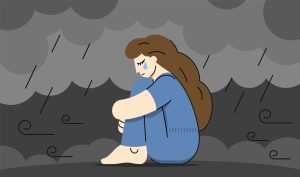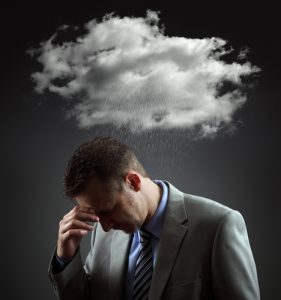If one is dealing with grief or loss it can be a difficult time to balance oneself emotionally. Adapting to loss can take a long time. Unfortunately, complications in the grieving process can occur which can lead to depression. Clinical Counselors can help individuals deal with depression however sometimes medication are required to help balance the brain during depression. Many prefer healthy coping strategies or herbal remedies.

One successful strategy is exercise. Exercise has an ability to release endorphins that elevate one’s mood and grant a higher sense of self and accomplishment. Of course the biggest problem is motivation to work out or exercise while depressed but for those who are able to find the ability to exercise, will find rewards during depression. Exercise has been shown to be more effective for individuals dealing with depression. The article, “Move Your Mind: Exercise Outperforms Medication for Depression and Anxiety” by Ben Singh, Carol Maher, and Jacinta Brinsley from University of South Australia reviews the benefits of exercise to cope with depression over various medications. The article states,
“Exercise is believed to impact mental health through multiple pathways, and with short and long-term effects. Immediately after exercise, endorphins and dopamine are released in the brain. In the short term, this helps boost mood and buffer stress. Long term, the release of neurotransmitters in response to exercise promotes changes in the brain that help with mood and cognition, decrease inflammation, and boost immune function, which all influence our brain function and mental health.”
“Move Your Mind: Exercise Outperforms Medication for Depression and Anxiety”. Ben Singh, Carol Maher, and Jacinta Brinsley. April 11th, 2023. SciTechDaily.
To review the entire article, please click here
Commentary
Holistic and Integrative Health Care Specialists look for alternative and other ways to help individuals face mental and physical issues from a more natural standpoint. Grief Counselors also look to help individuals cope with grief through support and advice. The simplicity of exercise alone can play a key role in a grief counseling plan as a well as a holistic perspective in dealing with loss and if worst depression.
A Closer Look at Grief and Exercise in Holistic and Integrative Practices
Depression is a complex mental health condition that affects millions of people worldwide. It can be caused by a variety of factors, including genetics, trauma, and environmental stressors. Symptoms of depression can include persistent feelings of sadness, loss of interest in activities, changes in appetite and sleep patterns, and difficulty concentrating.
While depression is often treated with medication and therapy, these methods may not be enough for some individuals. That’s where a holistic approach comes in. Rather than simply addressing the symptoms of depression, a holistic approach takes into account the whole person and aims to treat the root cause of the problem.
The Limitations of Traditional Treatment
Traditional treatment methods for depression can be effective, but they often only address one aspect of the problem. Medication, for example, can help alleviate symptoms of depression, but it doesn’t address the underlying causes of the condition. Similarly, therapy can be helpful in providing coping mechanisms and support, but it may not be enough to fully address the problem.
That’s why a holistic approach that considers the whole person is so important. By addressing all aspects of the problem – physical, mental, and emotional – a holistic approach can be more effective in treating depression.
What is a Holistic Approach to Depression?
A holistic approach to depression is one that takes into account the whole person – mind, body, and spirit. Rather than simply treating the symptoms of depression, a holistic approach aims to treat the root cause of the problem. This can include addressing physical health issues, such as poor nutrition or lack of exercise, as well as emotional and spiritual issues.
A holistic approach to depression may include a variety of different treatments, such as therapy, medication, and alternative therapies like acupuncture or massage. The goal is to create a comprehensive treatment plan that addresses all aspects of the problem.
The Importance of Exercise for Mental Health

Exercise is a powerful tool in the fight against depression. Research has shown that regular exercise can be just as effective as medication in treating mild to moderate depression. Exercise releases endorphins, which are natural mood-boosters, and can help reduce stress and anxiety.
In addition, exercise can have a positive impact on self-esteem and confidence, both of which can be negatively affected by depression. By incorporating exercise into a depression treatment plan, individuals can improve their overall mental health and well-being.
How Exercise Affects the Brain and Body
Exercise has a powerful impact on both the brain and body. Physically, exercise can help improve cardiovascular health, increase muscle strength and flexibility, and improve overall physical fitness. Mentally, exercise can help reduce stress and anxiety, improve mood, and increase cognitive function.
Research has also shown that exercise can help promote the growth of new brain cells, which can help improve cognitive function and reduce the risk of cognitive decline. By incorporating regular exercise into a depression treatment plan, individuals can improve both their physical and mental health.
The Benefits of Incorporating Exercise into Your Depression Treatment Plan
Incorporating exercise into a depression treatment plan can have a number of benefits. First and foremost, exercise can help improve mood and reduce symptoms of depression. In addition, exercise can help improve overall physical health and well-being, which can have a positive impact on mental health.
Regular exercise can also help individuals develop a sense of routine and structure, which can be helpful in managing depression. Exercise can provide a sense of accomplishment and can help improve self-esteem and confidence.
Types of Exercises Recommended for Depression
There are a variety of different types of exercise that can be effective in treating depression. Aerobic exercise, such as running or cycling, can be particularly effective in reducing symptoms of depression. Yoga and other mind-body practices can also be helpful in reducing stress and anxiety.
Strength training, such as weightlifting, can help improve overall physical fitness and can have a positive impact on mental health as well. Finding an exercise routine that you enjoy and can stick to is key in incorporating exercise into a depression treatment plan.
Incorporating Other Holistic Practices into Your Routine
In addition to exercise, there are a variety of other holistic practices that can be helpful in treating depression. These can include therapy, meditation, acupuncture, massage, and more. By incorporating a variety of different practices into a depression treatment plan, individuals can address all aspects of the problem and improve overall health and well-being.
Additional Resources for Holistic Depression Treatment
If you’re interested in a more holistic approach to depression treatment, there are a variety of resources available. Talk to your doctor or mental health professional about incorporating exercise and other holistic practices into your treatment plan. You can also look for local support groups or classes that focus on holistic health and wellness.
Conclusion: Taking a Holistic, Whole-Person Approach to Depression

Depression is a complex condition that requires a comprehensive treatment plan. While traditional treatment methods can be effective, they often only address one aspect of the problem. By incorporating exercise and other holistic practices into a depression treatment plan, individuals can address all aspects of the problem and improve overall health and well-being.
It’s important to remember that there is no one-size-fits-all approach to depression treatment. What works for one person may not work for another. That’s why it’s important to work with your doctor or mental health professional to develop a personalized treatment plan that addresses your unique needs and circumstances.
If you’re struggling with depression, know that there is hope. By taking a holistic, whole-person approach to treatment, you can improve your mental, physical, and emotional health and live a happier, healthier life.
Please also review AIHCP’s Holistic and Integrative Healthcare Specialist Program as well as AIHCP’s Grief Counseling Certification. The program is online and independent study and open to qualified professionals. Please review and see if the programs meet your academic and professional goals.








